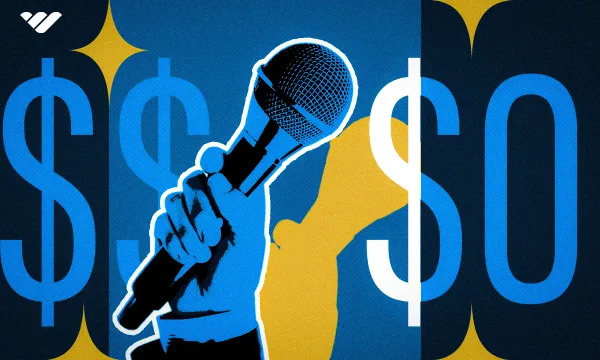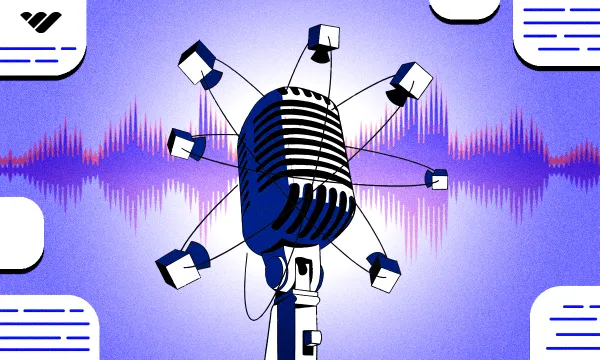Want to start a podcast? Good news - now is a great time. Listeners are set to reach a new peak of 500 million in 2024, and the market is now worth a mind-boggling $27 billion. It's time to jump on that train while you can!
Better yet, anyone can start a podcast. You just need some basic equipment and a cool idea. You can also make some pretty sweet money if you monetize your podcast with Whop.
The platform where you host your podcast will play a role in its success, so it's an important choice. Check out the best podcast platforms that we've tested ourselves.
What is a Podcast Hosting Platform?
A podcast hosting platform is exactly what you'd expect: it's the place that hosts your files and makes them available to listeners. It's the foundation of the whole listening experience, which is why it's so important to pick the right one for you and your followers.
Aside from the hosting, podcast platforms are now built to provide many more useful features, including support with editing, mastering, and producing video content. Plus, they will often generate transcripts for each episode automatically, which makes it easier for you to keep your content accessible.
Many platforms also offer features like in-depth listener analytics to help you understand who your target audience is and what works for them. This makes it easier for you to create an accurate target persona.
Podcast platforms also generate an RSS (Really Simple Syndication) feed for you, which carries the information about your podcast to all the major directories. With the RSS feed, your audience stays informed on new episode uploads. (You can also keep them posted with a newsletter)
A podcast isn't just about the fun or money - you have the potential to create a successful brand. The first step is choosing the right hosting platform. Different platforms offer different features, suiting particular types of podcasters, so which one is best for you? Let's find out.
15 Best Podcast Hosting Platforms
1. Buzzsprout

If you're new to the podcast game, Buzzsprout is a well-known hosting platform. Its user interface is designed to be simple for beginners with features such as Magic Mastering streamlining the path from recording to editing to distribution.
Once you've set up your podcast, Buzzsprout helps you figure out what's popular and what's not. It gives you analytics on listener behavior, such as how many plays each episode has had in the last few days, weeks, or months, and which platform they're using.
Pros
- Magic mastering for inexperienced audio-engineers
- Automatically generated transcript which can be displayed for each episode
- Plenty of supportive tutorials
- 90-day free trial on paid packages
- Lets you create clips of your episodes for promotion
Cons
- Doesn't enable video-recorded podcasts
- The free tier only stores your episodes for 90 days
Price: Free tier; then $12-$24 per month
2. CoHost
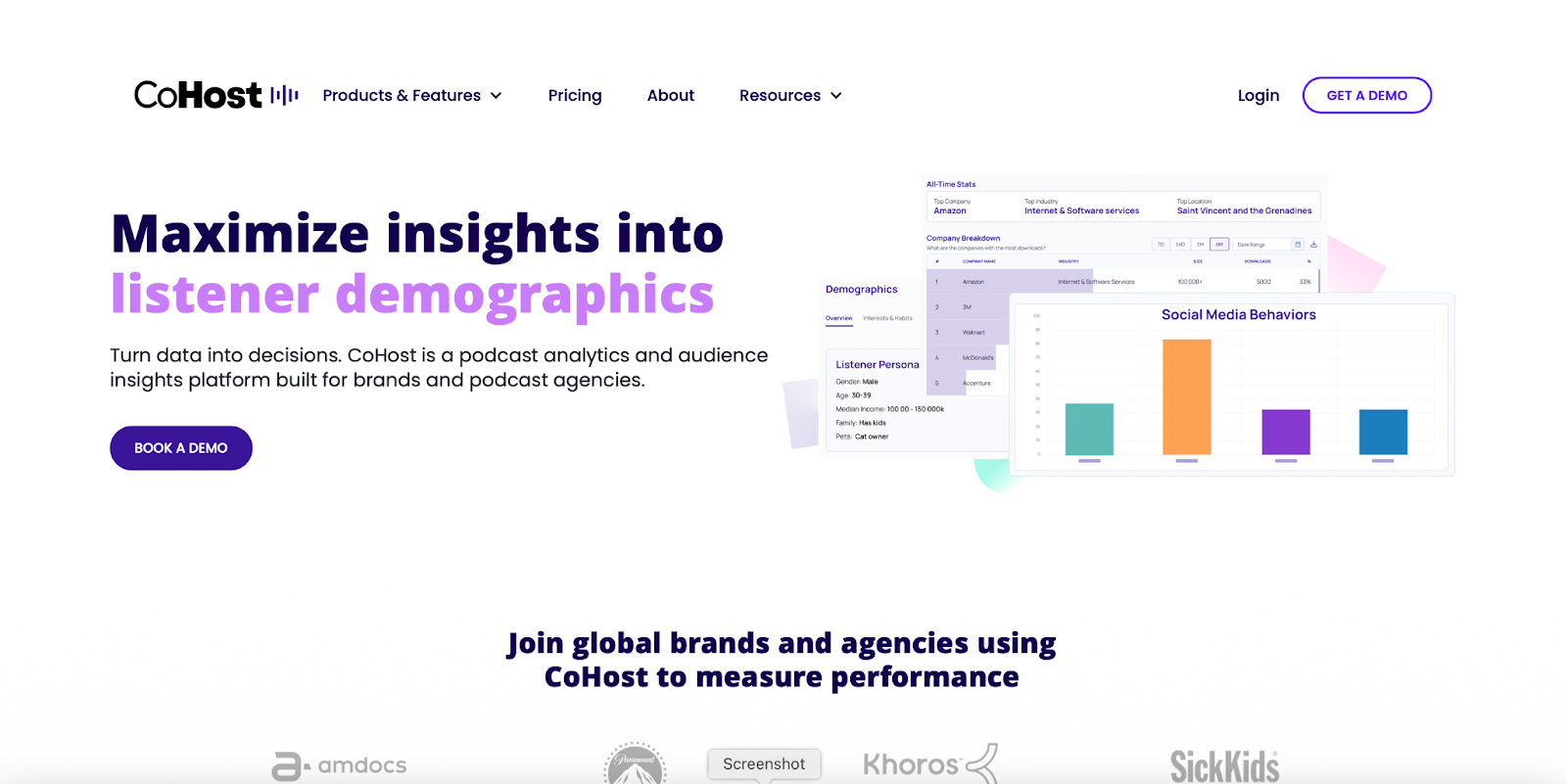
Are you looking for in-depth data and tools to boost growth? CoHost could be a good choice for you. This platform is used by a host of successful companies, such as PwC and Paramount.
CoHost is unique in helping you discover things you need to know about the companies and industries your listeners work in. While it's not as popular among hobby podcasters, it's a great option for businesses.
Pros
- Analytics dashboard with listener patterns and growth charts
- Distributes your podcast to Apple, Spotify, Google, and more
- Demographic data related to age, income, family set-up, and more
- Tools for sharing your podcast through social media and email
- AI-generated transcriptions for each episode with easy editing functions
- Juggle multiple shows and users
- Unlimited storage
Cons
- No free plan or trial option
- Some reviewers note a slow user support service
Price: $35 per month
3. Podbean
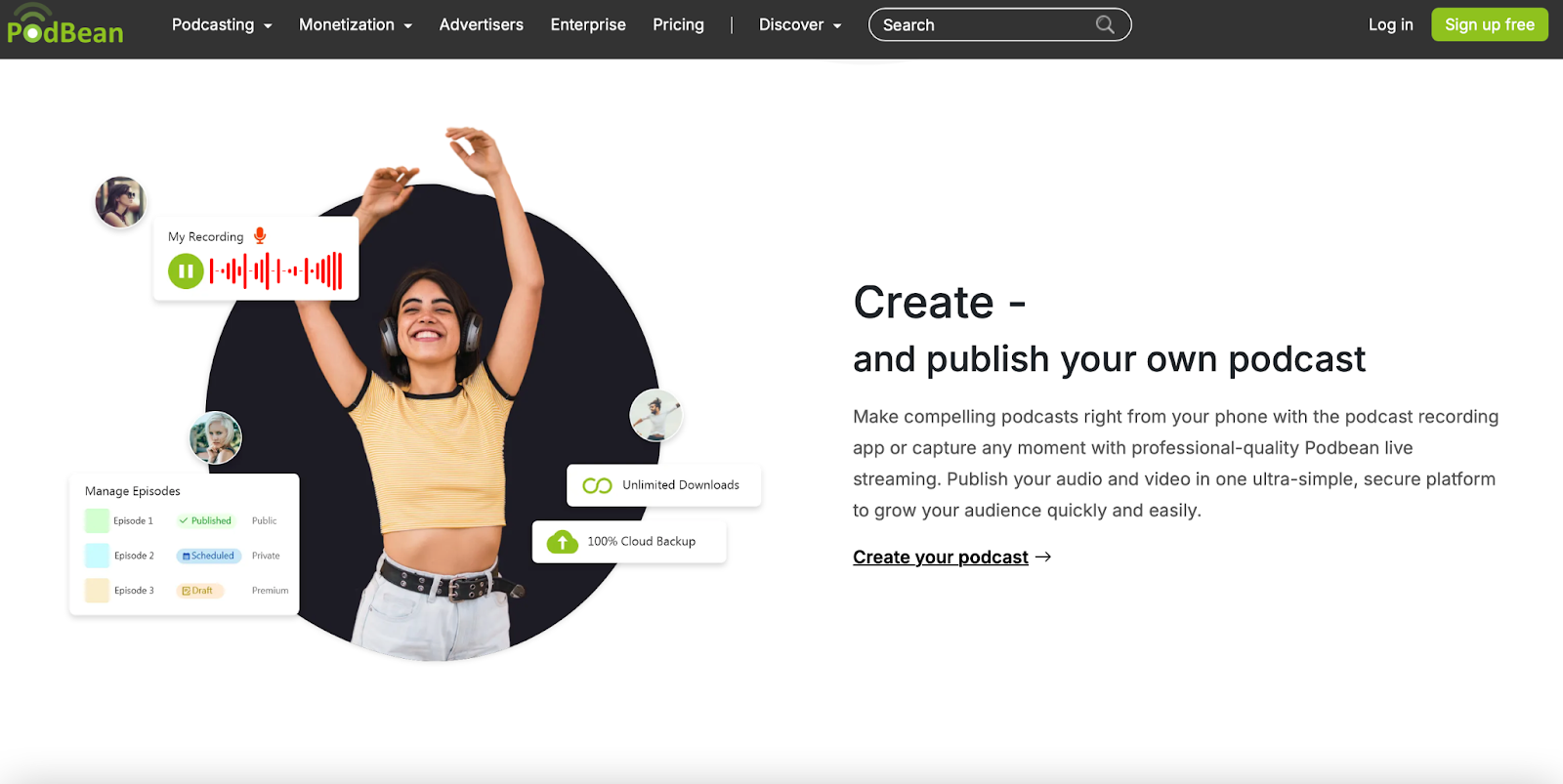
Podbean's emphasis on accessibility and reliability makes it another great option for beginners. This user-friendly platform caters to audio and video content, with an extensive range of features to help you host, share, and monetize your podcast.
The platform helps you insert ads, find sponsorships, and manage subscriptions. If you're looking to monetize your podcast from the start, you'll find plenty of guidance with this platform.
Pros
- Plenty of monetization tools
- Easily customizable templates for website creation
- Automatically connects with social media platforms
- Embeddable formatting for other websites/blogs
- AI tool for transcription, editing, and noise canceling
- Lower-tier plans have limited features
- Limited storage on basic plans
Price: Free plan, or $9-$79 per month
4. Castos
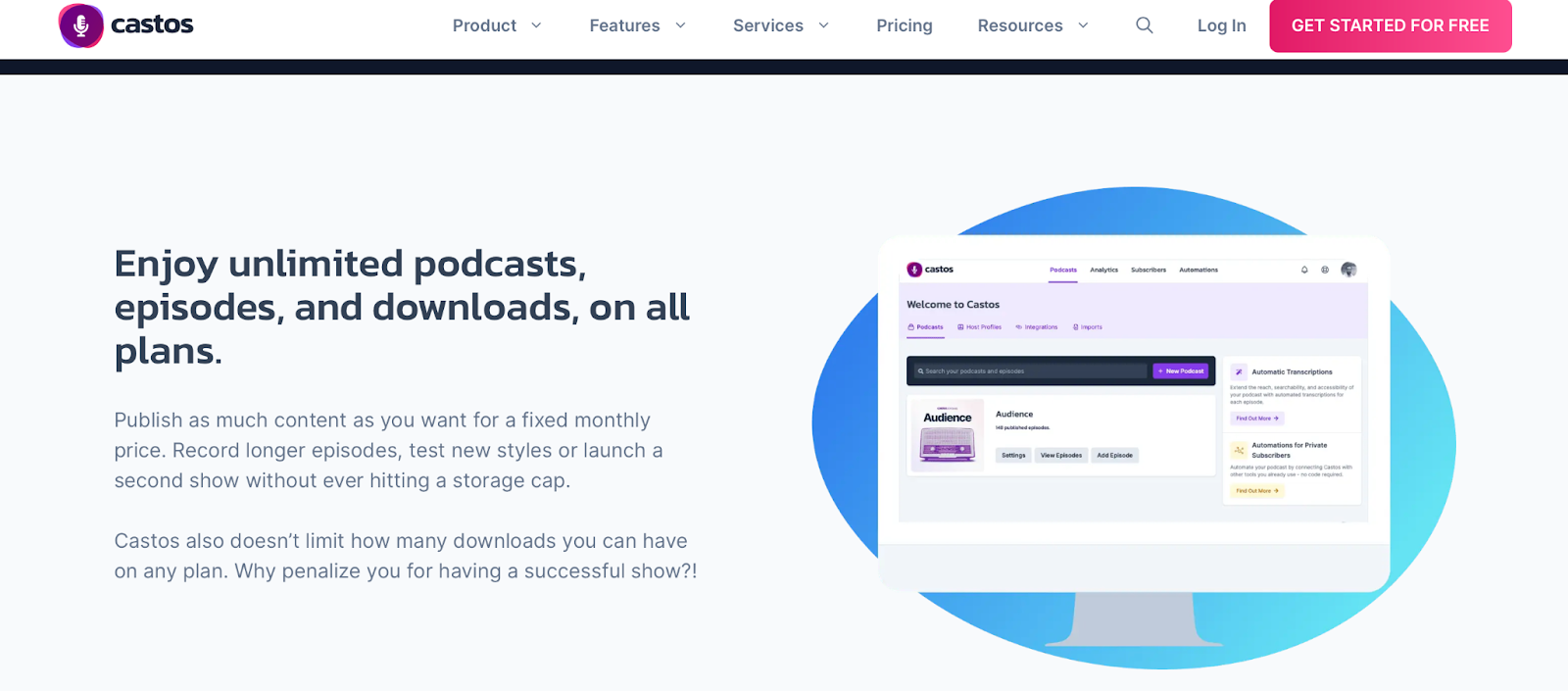
Castos is a pretty straightforward platform, even for beginners, with the option to create unlimited content—although it comes at a price. It's also pretty easy to integrate into your WordPress website, if you have one, as the two companies have teamed up.
Or perhaps you're looking to make something more exclusive? Castos can also cater to you with its tool for creating premium products.
Pros
- Seriously Simple Podcasting plugin for insertion on WordPress
- Monetization tool for exclusives and user donations
- Transcription service
- Analytics on listener demographics, habits, and episode popularity
- Built-in editing tools
- Enables video and audio podcasts
Cons
- Less advanced tools and analytics than other platforms
- No free plan
- The highest plan is staggeringly expensive
Price: 14-day free trial/$29-$699 per month
5. Simplecast

Simplecast excels in its analytics, with advanced insights into listener demographics and habits. On the content side, there is also the opportunity to make websites and shareable videos through its Recast tool. If you're hoping to make a living from podcasting, this could be a good solution for you.
As well as these analytics and tools, one of Simplecast's greatest perks lies in its scalable hosting. Whether you run a small podcast or a massive one, you can make it work.
Pros
- Recast tool for creating video clips
- Customizable website template
- Various types of audio/visual Webplayers (depending on price plan)
- Analytical insights on streaming patterns and listener demographics
- Integration with marketing platforms
- Options for private podcasts or team collaboration
Cons
- No free plan
- Limited customization options
Price: 14-day free trial/starting at $15 per month
6. Megaphone

Within the podcast world, Megaphone is on the "upmarket" end, but that might be exactly where you belong!
Owned by Spotify, Megaphone prides itself on exclusivity—your episodes will need at least 20,000 plays a month to join. But once you're at that level, there are lots of opportunities for monetization. That's why it's the preferred choice of publishers, brands, and big media companies.
Pros
- Podcast hosting functions suited for publishers and marketing-facing networks
- Seamless ad insertion to maximize revenue, filtered by specific audience location
- Monetization opportunities with access to Spotify Audience Network
- In-depth analytics into listeners demographic and purchase intent via Nielsen (global-leader for audience measurements)
Cons
- Too exclusive for beginner podcasters
- More expensive than most other platforms
Price: upward from $99 per month
7. Libsyn
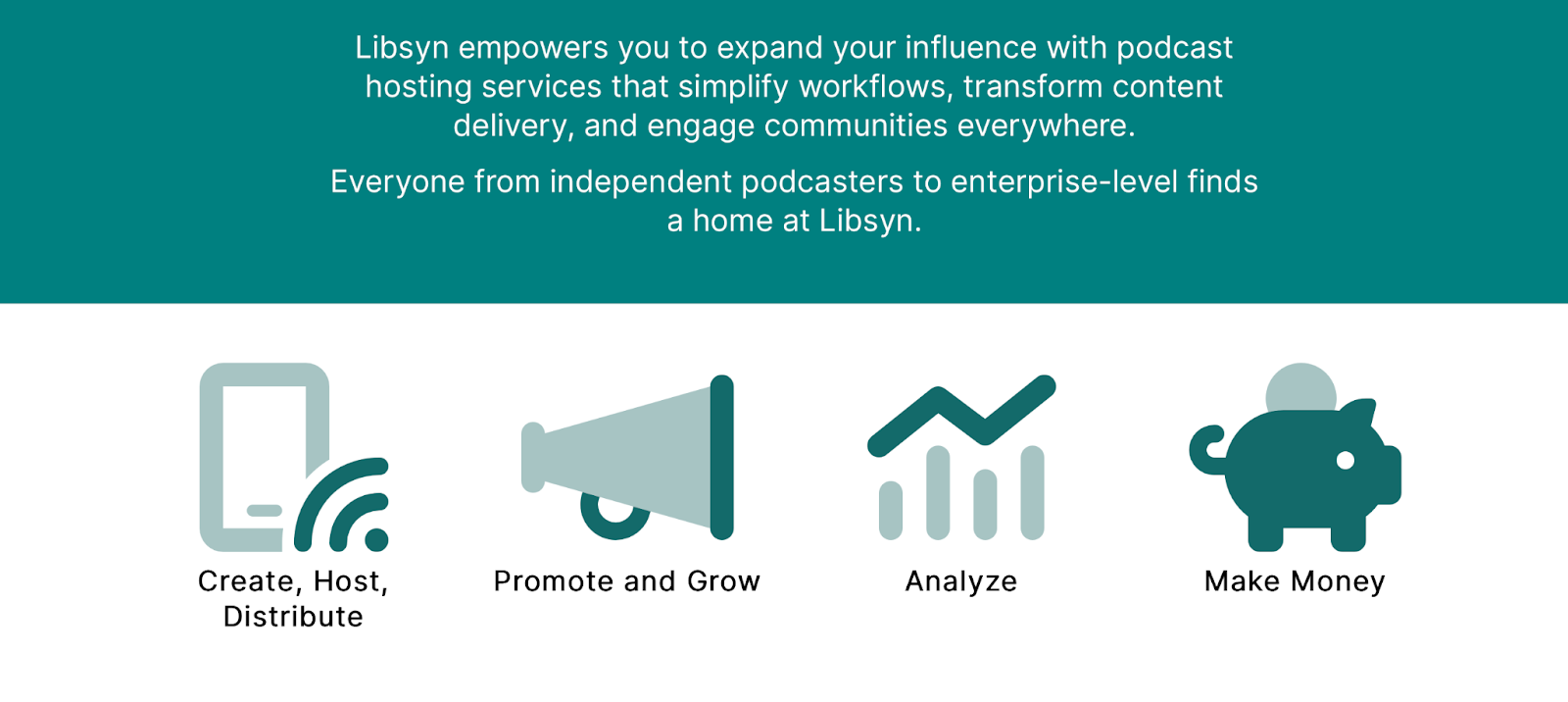
Libsyn is one of the most popular podcasting platforms. Whether you're a beginner, expert, or somewhere in between, Libsyn's got a package for you.
It has 6 pricing plans and the special features multiply at each stage, with opportunities for video creation and publishing at the top of the tree. While it's pretty barebones in the cheapest plan, it only gets better the more you pay, although its user interface could use a refresh.
Pros
- Dynamic ad insertion
- Video creation and publishing
- Monetization opportunities through subscription fees, member-only newsletters, exclusives, and ad-free content
- Helps users understand target audience with insights and interactive charts on preferences and habits
Cons
- No free plan
- Limited features at the lower pay plans
- Fairly steep learning curve
Price: $7-$150 per month
8. Blubrry
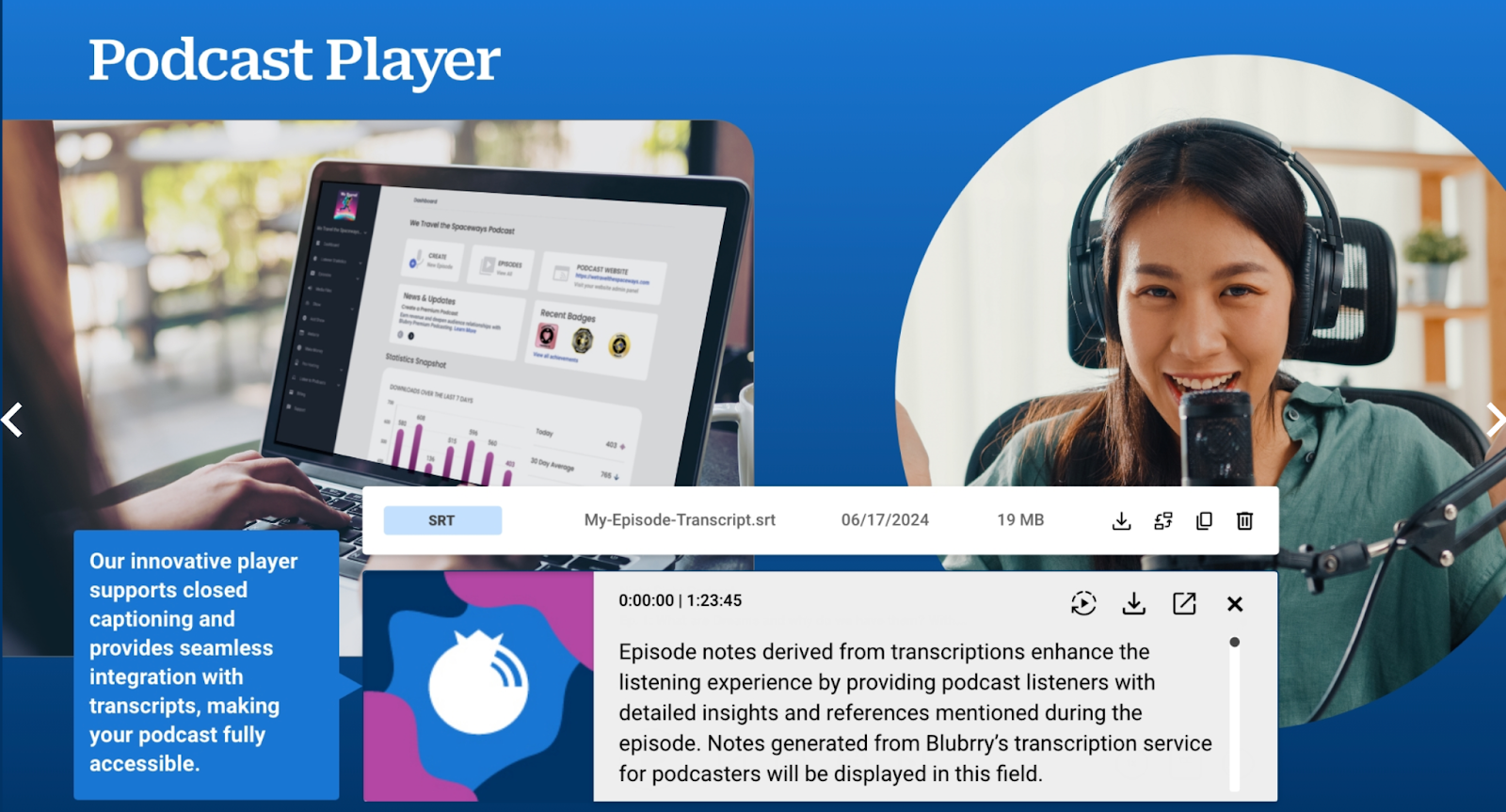
This platform is on the more affordable end of the spectrum, so if you're working on a lower budget, this is your best bet. It also offers a fairly unique no-fault coverage policy, which means that even if you exceed your monthly storage limit, you won't be charged extra.
Blubrry's in-depth statistics and surveys help you to understand your audience, while its Media Kit helps you display your success for advertisers. Once your podcast starts leveling up, you can also upgrade your hosting with its multiple pricing packages.
Pros
- Includes a customizable WordPress plugin (PowerPress)
- Shares your podcast on all the major platforms
- Insights on episode stats and listener habits
- Option for private podcasts
- Audio mastering function
Cons
- No free plan
- WordPress integration may feel overwhelming to beginners
Price: $12-$120 per month
9. Transistor
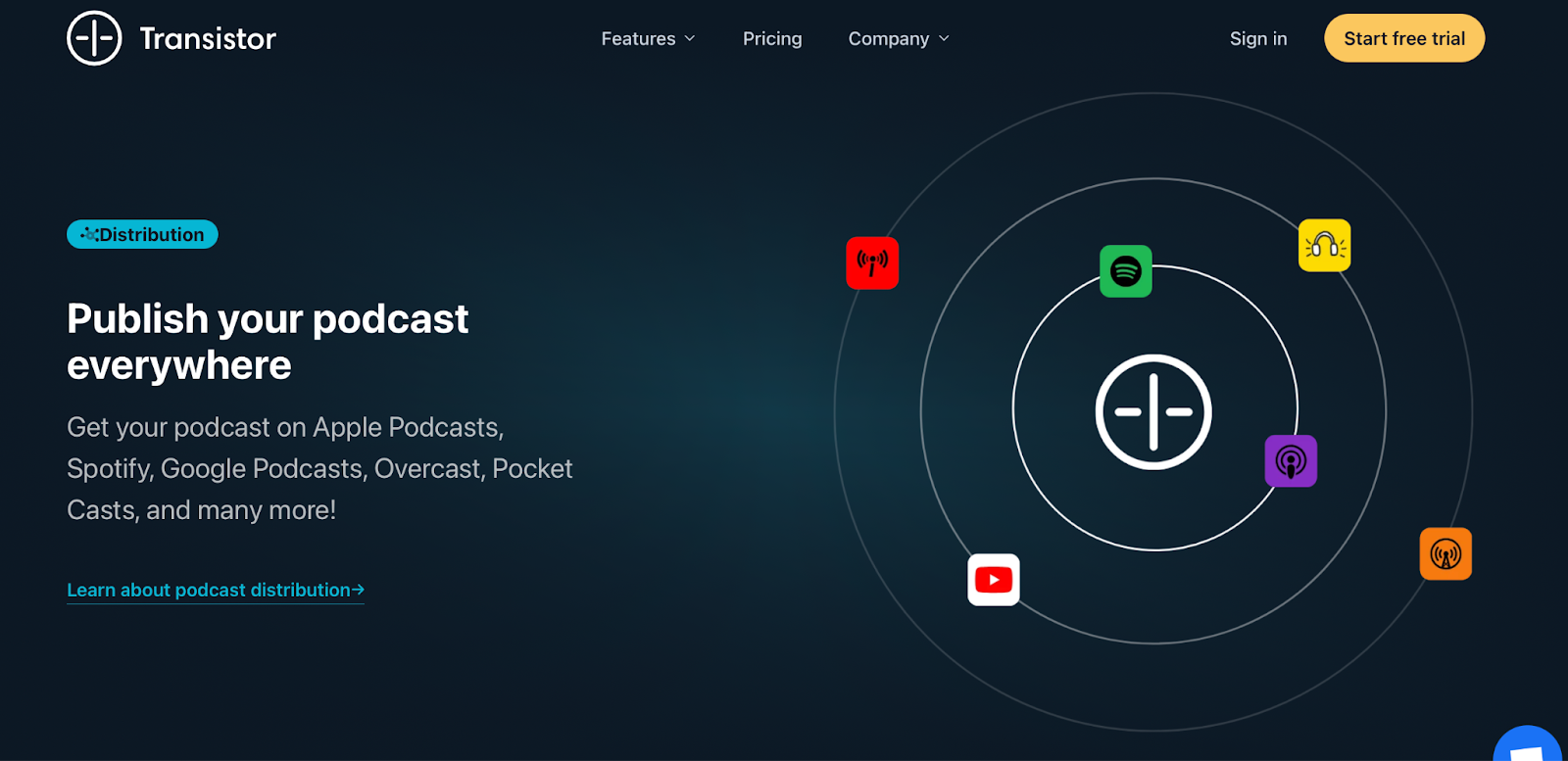
Transistor is a good option if you can see yourself (or your company) making it big in the podcasting world. One of its main perks is that it comes with team collaboration features. On top of that, you can create and host multiple podcasts under one account.
If you're a single podcaster building up your little empire, you're better off with another option on our list. This platform is not the cheapest, and it only gets more expensive as your podcast grows, since the plans are based on the number of monthly downloads.
Pros
- Monetization tools with Patreon integration and Apple Podcast subscription
- Automatic transcripts with clickable time stamps
- Private podcast option for in-house teams
- Analytics on listener trends and episode performance
- Customizable website for every podcast you create
- Distributes show everywhere, including auto-posting to YouTube
Cons
- No free plan
- No integrated service for audio and visual editing
- Download-based pricing
Price: 14-day free trial / $19-$99 per month
10. Captivate
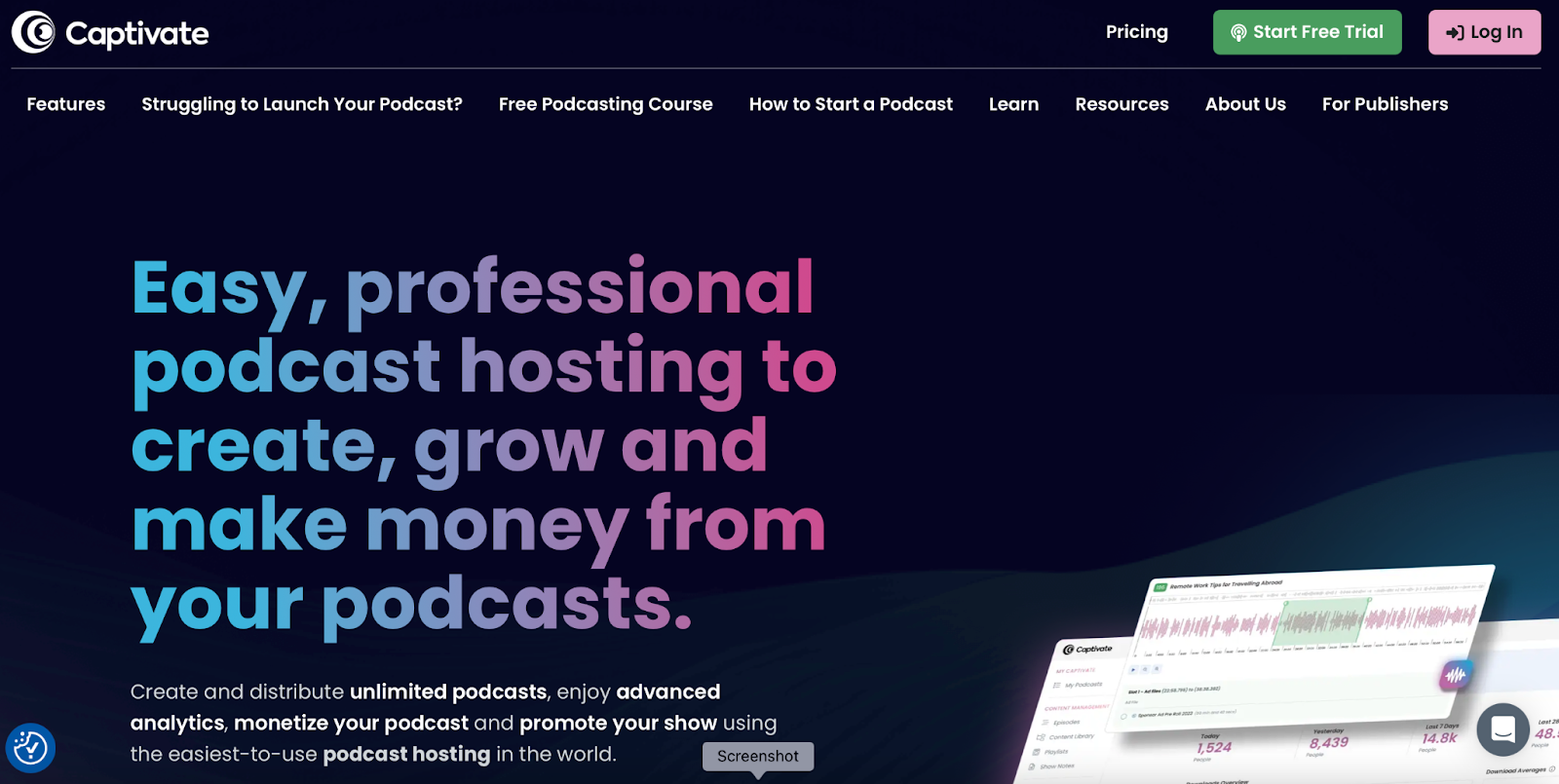
Captivate has a lot in common with Transistor. Here, too, you get unlimited podcasts and episodes, and on all pricing tiers. If you could see yourself hosting a long-running podcast series, this is important.
The platform also provides in-depth, IAB-certified analytics, complete with listener demographics and episode performance. Moreover, you can have multiple users with various permission levels, so it's a good pick if you're not a solo podcaster.
Pros
- Single-click episode distribution to Apple, Spotify, Google, Amazon, and more
- Unlimited hosting and private option for internal company podcasts
- Monetization tools such as member-only releases, early access material
- Access to Q&A sessions and educational Facebook group
- Dynamic "show-notes" created for each episode
Cons
- No free plan
- Pricing based on monthly downloads
- Expensive for high-volume podcasts
Price: 7-day free trial/$17-$90 per month
11. Spotify for Podcasters
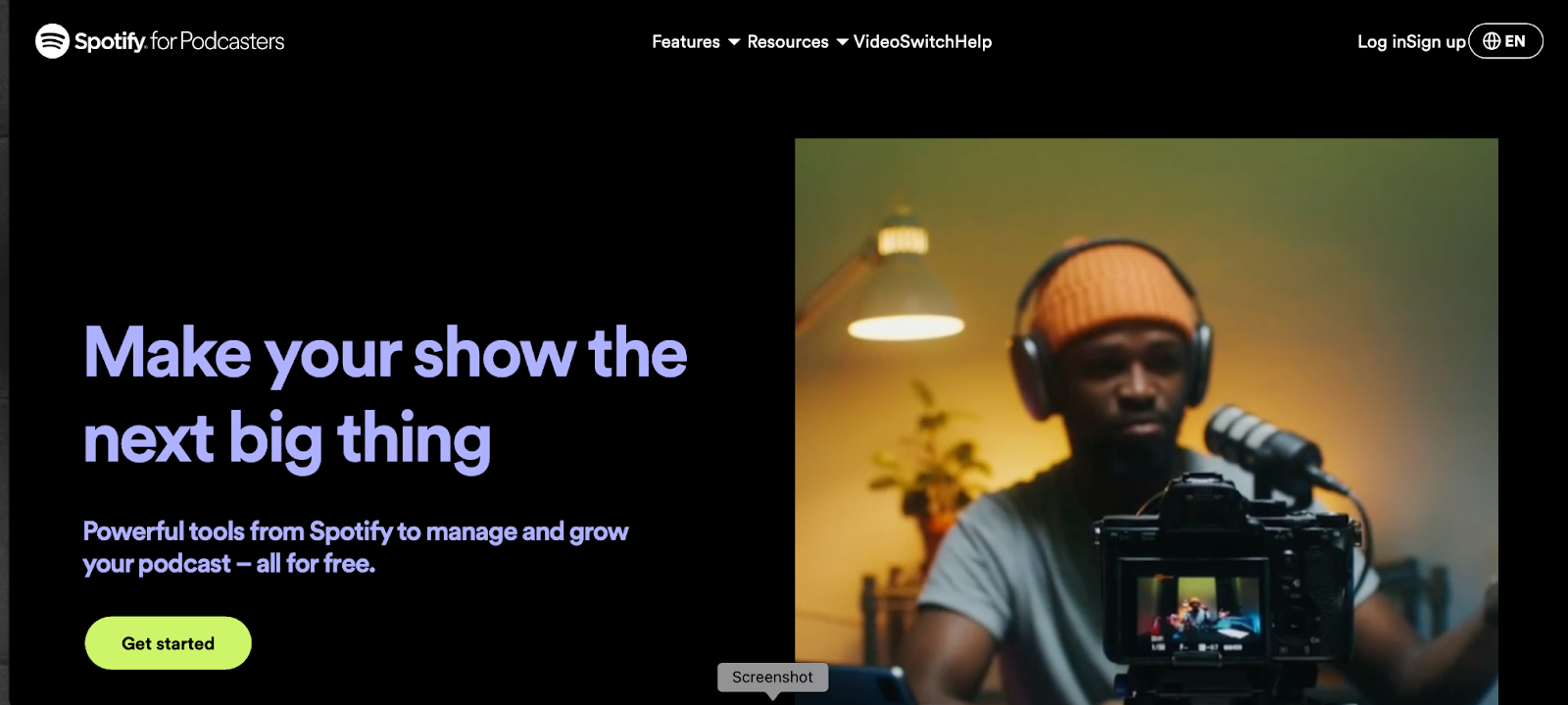
We've all heard of Spotify—it's that giant streaming service that gets everyone excited once a year with its Spotify Wrapped. Now, it's jumped into the hosting game, and you can try it out for free.
Using a platform like Spotify is just about as secure as it gets, with a wide audience reach and a user-friendly interface. The downside? Everything is Spotify-exclusive, so you can't get your podcast on Apple Podcasts and other competitors.
Pros
- You can make money through ads, sponsorships, and donations
- Option to upload snazzy videos
- Listening data for you to track performance
- Connect with your fans through polls and comment sections
Cons
- Sponsorships are only available for U.S. users
- More suited to beginners than brands/experienced podcasters
- Spotify exclusive
Price: Free!
12. Spreaker
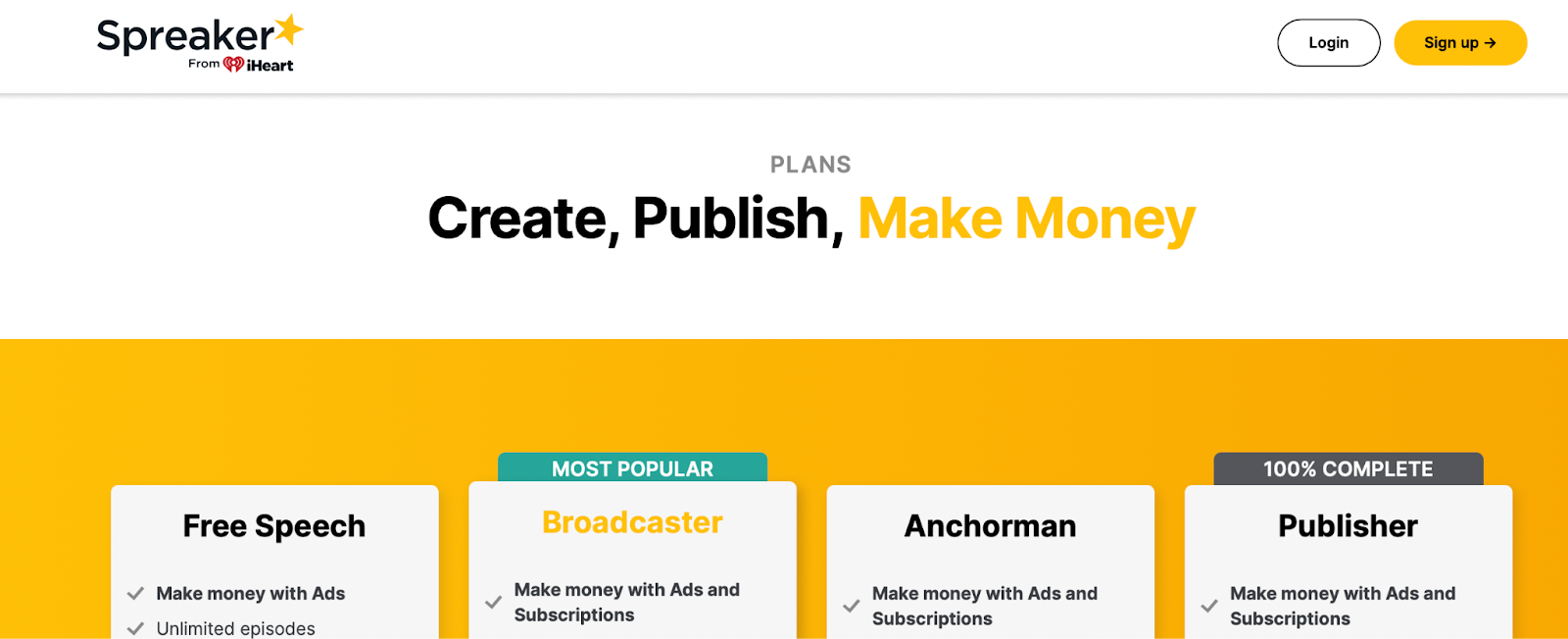
Are you up for an unscripted chat? Then Spreaker might be for you. It offers a rare live podcasting feature, which lets you connect with your fans on a whole new level. Combine that with listener donations—which are also supported—and you can start making money.
Mind you: If you're looking for something budget-friendly with lots of storage, Spreaker isn't it. The lower-tier plans have very limited storage and bandwidth, so having many episodes, or long episodes, is a no-go.
Pros
- Live streaming capability with a comment section for listener engagement
- In-depth analytics on listener habits and demographics
- Automatic (but adjustable) ad insertion at points of your choosing
- Integration with social media platforms for easy promotion
Cons
- Less storage on cheaper plans
- The free plan has some restrictions on content uploading
- Ads on free plan
Price: Free plan/upward of $20 per month paid plans
13. Casted
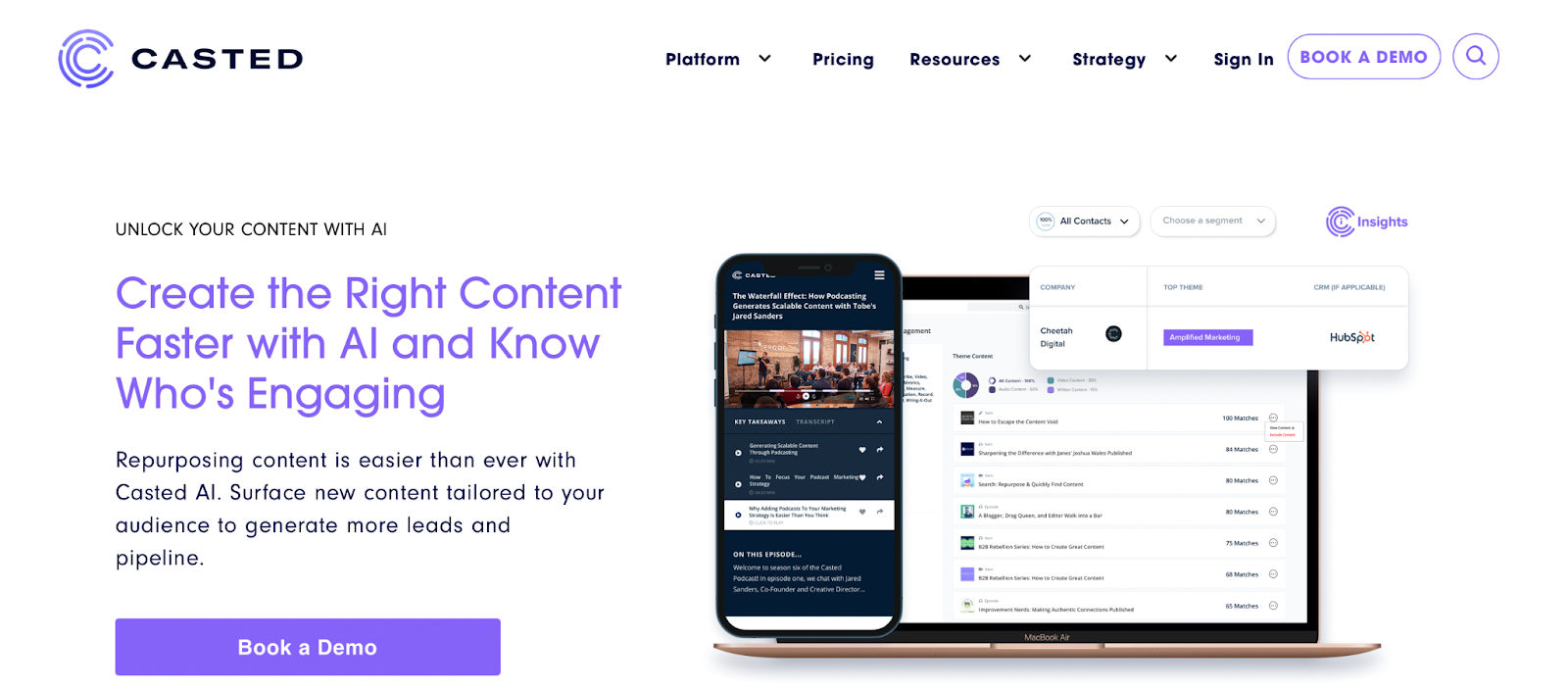
Is your marketing team looking to level up its impact? Casted is a B2B platform for delivering high-quality content to a target audience of founders and CEOs.
This isn't your average podcast hosting service. It's more of a machine for creating and sharing promotional material, with quick and easy-to-use AI tools. It's a trusted favorite for B2B companies such as Salesforce and IBM. If you're trying to reach individuals and not companies, steer clear!
Pros
- Creates audio and video clips from your episodes
- Tools for sharing content on social media
- Allows you to host webinars
- Converts audio and visual content into transcripts
- Integration with CRM tools, such as HubSpot and Salesforce
Cons
- Extremely expensive
- Niche audience
Price: Upward of $1,000 per month
14. Audioboom
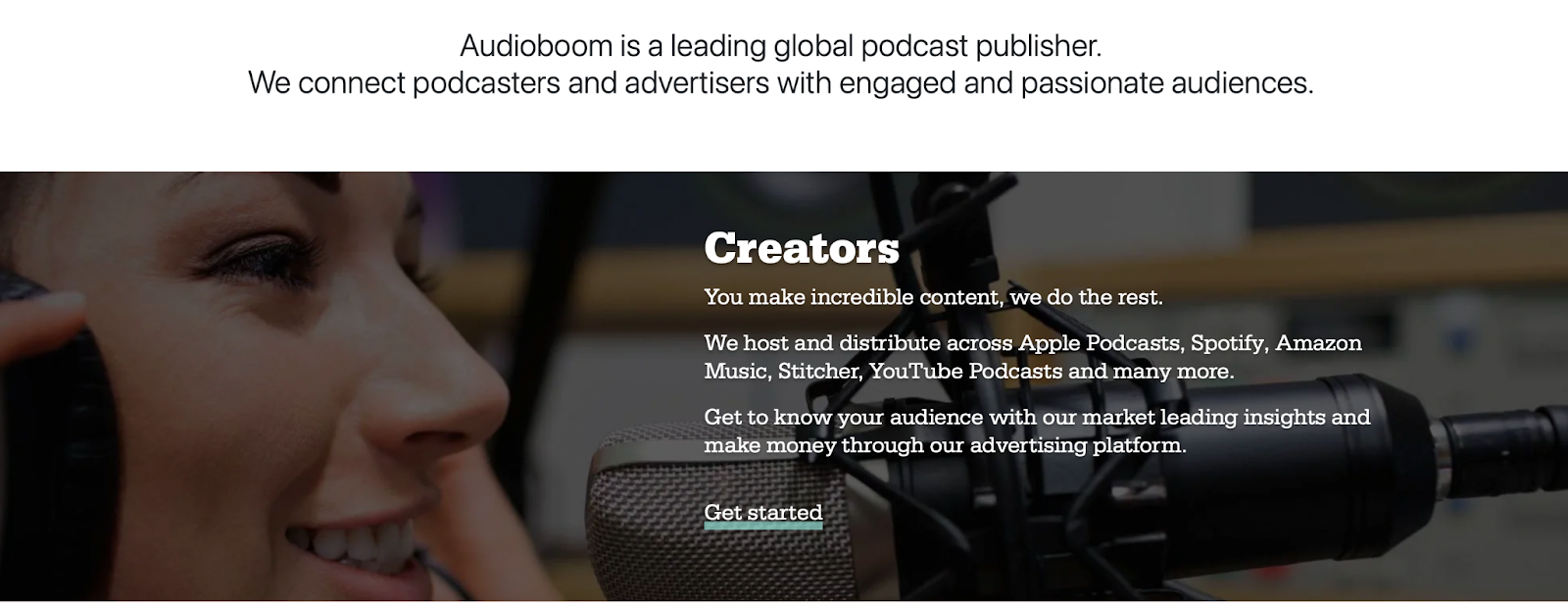
Audioboom caters to podcasters little and large. It has an entry-level plan for those with less than 15,000 plays per month. Then, there's the Podcaster Pro plan for anyone surpassing 50,000 downloads, which supplies you with some additional hosting and promotional features.
In any case, Audioboom gives you unlimited uploads, distribution to streaming services, and listener analytics. It also grants access to its premium advertising partners and its global marketing hub, Showcase.
Pros
- Unlimited episodes per month
- Episode distribution to Apple, Spotify, Google, Amazon and more
- Sponsorship opportunities with brand partners
- Audience insights on user-friendly analytics dashboard
- Embeddable players and seamless integration with social media platforms
Cons
- No free plan
- High minimum requirements for monetization
Price: Upward of $9 per month
15. Acast
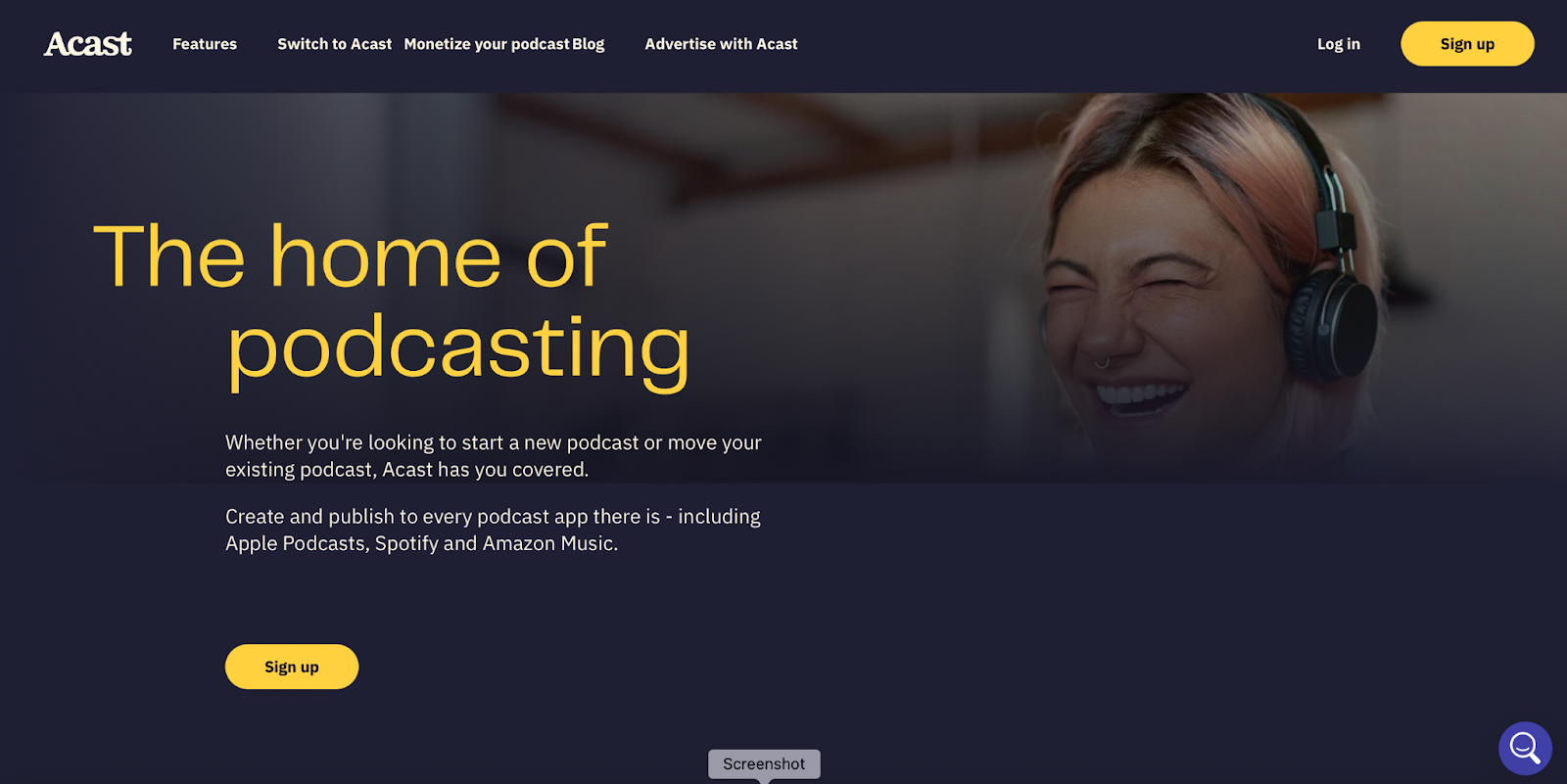
Acast is a hugely popular platform, with over 125,000 shows and more than 4 billion listens per year. If making money is your goal (and hey, even if it's not, wouldn't that be sweet?), you'll like the various monetization options on Acast. There's dynamic ad insertion, sponsorships, and premium content subscriptions through Acast+.
Pros
- Audio to visual conversion
- Advanced data insights on listener preferences and marketing impact
- Access to Acast virtual workshops with podcast pros, newsletters, and groups
- Personalized website creation
Cons
- Not the cheapest
- Some monetization options include revenue-sharing
Price: Upward of $25 per month
What Should You Look for in a Podcast Hosting Platform?
As you can probably tell from our list, there are lots of podcast hosting platforms, and no two are the same. In saying this, there'll be a lot of overlap between most of them, which makes choosing even harder.
What's important? Check out this list to make sure that your platform is the perfect one for your podcast.
Ease of use
No one wants to waste time figuring out how it all works—you shouldn't need a 50-page guide to set up your podcast. You want your platform to be as user-friendly as can be so that your time can be spent on better things, from brainstorming podcast ideas to keeping your followers happy.
Storage
In case you're still new to this, here's an important reminder: Podcast episodes are heavy, and we don't mean the topics—we mean the actual files. Audio and video files take up a lot of space, so storage can become an issue on the wrong platform.
Ideally, you want to be able to upload unlimited amounts of content and keep your episodes all in one place. Look for a hosting platform with the right amount of GB storage to match your volume of content.
Special features
If you're paying for a platform, make sure you're getting your money's worth. The exact scope of special features will vary depending on what you want to get out of your podcast, but some cool perks include:
- Built-in website
- Automated transcripts
- Uploads to major podcast platforms
- RSS feed management
- Team collaboration
- SEO optimization
- Audio and video editing tools
- Audiogram creation tools
- Live broadcasting
- Integration with other tools, like social media, email marketing, and CRM
A lot of platforms offer some of these, but if you want to get your hands on most of them, you'll likely pay a hefty monthly fee.
Distribution
What's a podcast if you can't share it with anybody? Most of the platforms on this list will distribute your episodes to the major directories: Apple, Spotify, Amazon, and more. You shouldn't expect anything less.
Listener analytics
Making podcasts is a fun hobby, but if you want it to become a job (or a side hustle), you'll need to take a deep dive into some useful listener analytics. Fortunately, almost every platform offers these to some extent.
This could be for audience demographics, episode performance data, or both. Whichever platform you go for, it should give you advanced insights on who's listening, where they're listening, and how well each episode performs.
Cost
Money, money, money… It's no surprise that your budget will play a part in deciding on the best podcast hosting platform for your needs.
Of course, this will be different for everyone. If you're a beginner, you might want to try a platform with a free trial or at least a cheap entry-level package. If you're more experienced, you'll want a platform that can equip you properly. This might mean a higher price, but you'll get the premium you pay for.
Most platforms have multiple pricing options, while some opt for revenue-sharing models or charge you more based on the number of your downloads.
Monetization strategies
Even a small podcast can make you some money, so a good platform should support you in that regard. Paid ads, sponsorships, subscriptions, and user donations are all things to keep an eye out for if you want to get paid for podcasting in the future.
- Our list of podcast topic ideas
- How many listeners do you need to make money on a podcast?
- The best podcast apps for audio lovers
What is the Best Way to Make Money With a Podcast?
You can make money with a podcast by including paid ads, participating in sponsorships, charging per episode, setting up monthly subscriptions, or getting viewer donations. That's not all there is to it, though. The best way to make money with a podcast is to not rely solely on your podcast.
There's only so much a hosting platform can do for you. Even if you rack up a nice amount of monthly listeners, there's a lot of money to be made off-platform. This is why many podcasters evolve their brands by expanding beyond just running a podcast. The best part is that getting started is super easy and only takes a few minutes.
So, how do you make some serious money with your podcast? It's simple: just join Whop.
Monetize Your Podcast With Whop
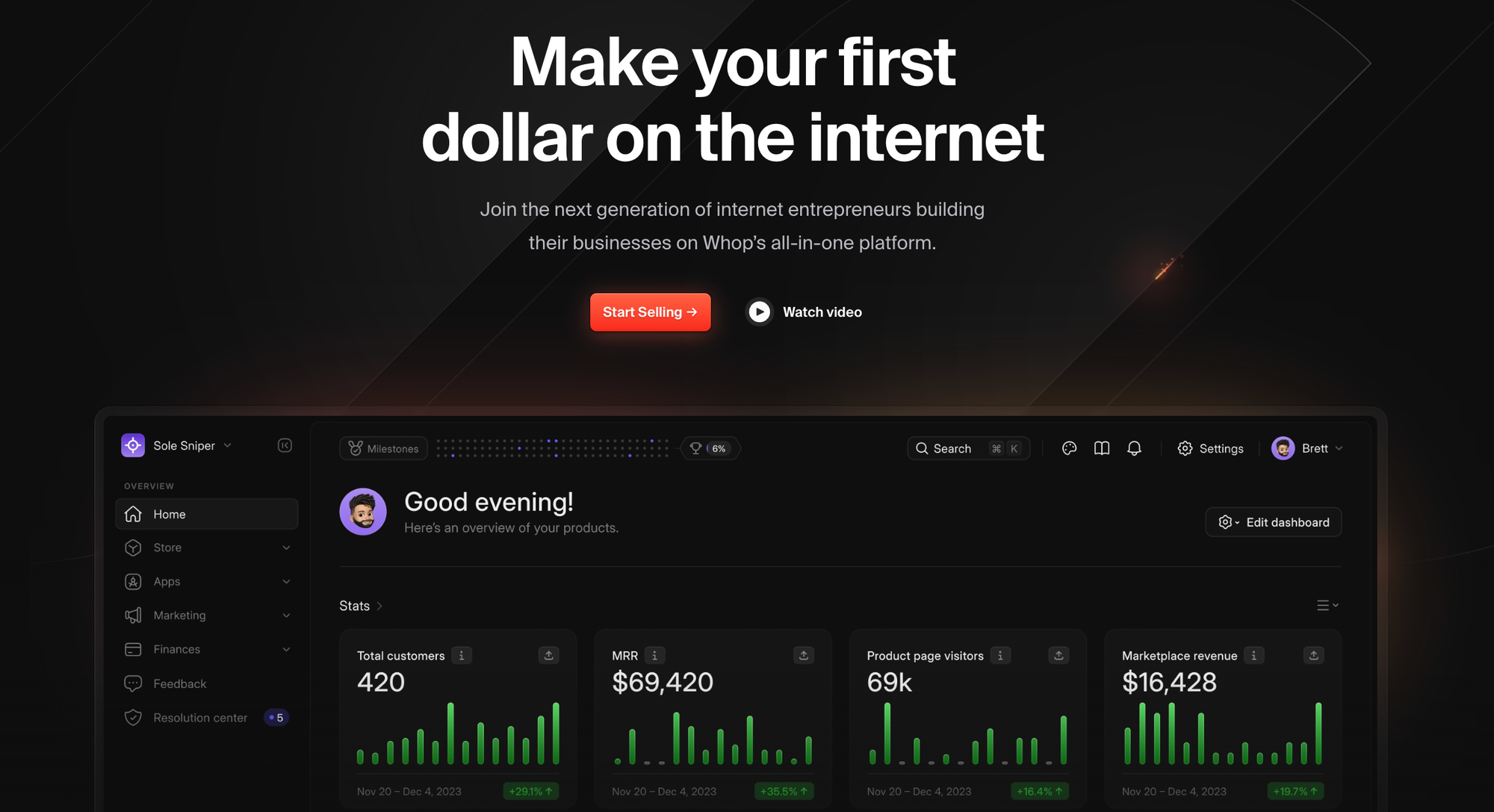
Once you've found a home base for your podcast episodes, it's time to take it to the next level and give your listeners even more to look forward to. Whop is the perfect platform to help you make this happen.
You can create your very own whop, where you can give them even more of the content they crave—and get paid for it! It's your own internet hub that you can create and sell access to all or part of (and it can be free, too). Your podcast listeners can buy digital products or become paid subscribers to access behind-the-scenes or premium content.
You can also evolve your podcast with ideas like:
- Setting up a private community for your listeners
- Ebooks
- Courses
- Downloadables, such as templates or worksheets
- Behind-the-scenes footage
- Premium content
- Early access to episodes
- Access to live events and webinars
- One-on-one calls with you
- Masterminds
Other successful podcasters, such as the Club 520 Podcast, are already making money on Whop. It's a win-win situation—you get paid for all your hard work, and your listeners get to learn more about the topics that interest them. It's the perfect way to build engagement and grow your subscriber base.
Getting started only takes a few minutes, and success awaits. Sign up with Whop today and get paid for your podcast.


